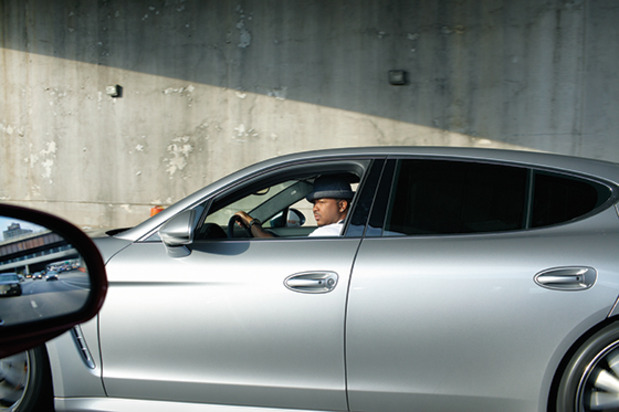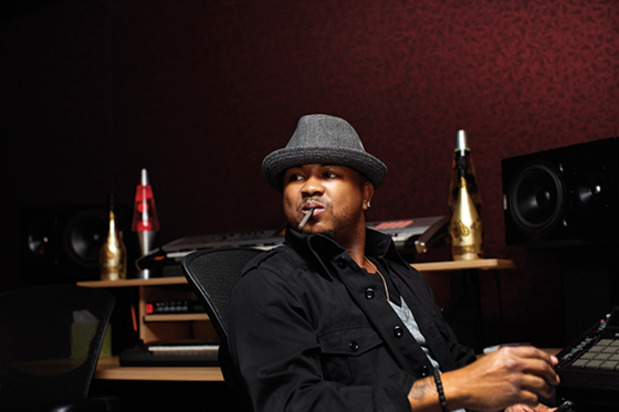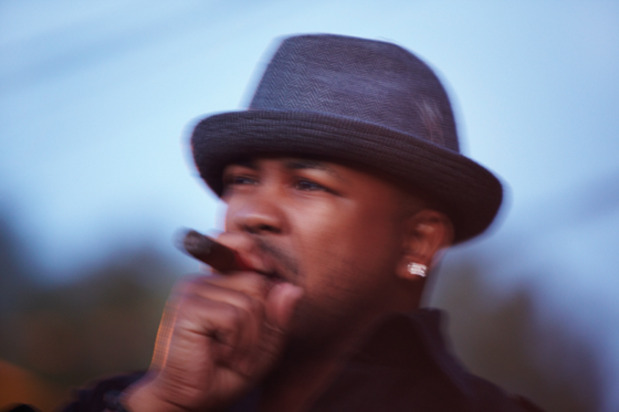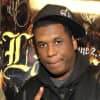Just as The-Dream steps out of his pearl Mercedes convertible in front of the home he owns on a wooded corner lot in the toney Buckhead section of Atlanta, a white lunatic leaps from the shrubbery. He bounds toward the Grammy-winning, multi-platinum artist with blank eyes and a toothy grin. The-Dream hardly seems bothered as the maniac bears down on him. This could be because this particular lunatic’s name is Louis, The-Dream’s rather large, slightly poofy poodle, who is clearly enjoying the fruits of his master’s labor. As Louis discovers, apparently for the first time, that the young holly trees lining the property do not actually prevent him from gallivanting through the neighbor’s yard, The-Dream steps out of one car to throw his golf clubs in the back of another, a husky Range Rover, also in lustrous pearl.
Drake is on the Range’s radio, but it was Little Richard in the Benz, with Dream singing along enthusiastically all the way. There is a shaded slate pool in the backyard, yet another pearly luxury car in the driveway—a Porsche for his personal assistant—and a motorcycle in the two-car garage. But The-Dream’s most telling acquisition is the empty foundation in the adjacent lot. He recently bought the plot after a war of attrition with its previous owner (who also sold The-Dream his house) that ultimately ended in a half-price recession sale. The-Dream gladly paid him in cash and has plans for a second adjoined house for his growing family. The-Dream pays everyone in cash. In fact, he has a hard time explaining to potential sellers of things he wants to buy that he doesn’t have bad credit, he just doesn’t have good credit because he never pays for anything he can’t pay for in full. Everything you see around The-Dream, or hear him on for that matter, The-Dream owns, which is startling when you consider the implications.
But The-Dream is not bourgeois. As much as he has, not much of it seems that important to him. His tastes are expensive but not extravagant, and he’s as invested in giving to others as he is himself. Over the course of a few days he makes multiple generous offers to multiple people. When a manager compliments his Nikes, Dream offers to drive to the outlet mall outside of Atlanta to buy a pair for everyone in the room, because, as he says, “I want you to be fly.” When his ever-present cigar box filled with pricey imports is opened, he offers one to anyone around. And when the website of the Florida resort Dream stays at when working in Miami makes my pupils dilate, he offers to pay for my vacation, saying “If I find out you went down there and didn’t let me pay for it, I’m going to be really upset.”
As nice as it is to be offered lavish gifts, this is not what makes Dream good to be around. He’s one of the funnier people you will ever meet, constantly punchlining conversations and lightening work with gentle ribbing. One night, as Dream works on several projects at once in his studio, his assistant delivers a small cup of lime sherbet at his request. He thanks her and then goes on a five-minute rant about the miracle of sugar while spooning it up. The banter with his studio engineer Pat Thrall—a dead ringer for The Eagles’ Joe Walsh—is so ridiculous it almost seems rehearsed. And during our photoshoot, he points out that the reason his slim T-shirt looks extra slim is because “there’s a piece of cake out there for every hit I’ve made.” That is, no offense to Dream’s physique, a lot of cake.
Along with his partner Christopher “Tricky” Stewart and a loyal team of engineers and vocal specialists, The-Dream has built a startling catalog in a very short time. Since getting his first break from Tricky’s brother and fellow producer, Laney Stewart, in 2001 writing songs for boy-group B2K, Dream has made career-defining classics for Beyoncé (“Single Ladies”), Rihanna (“Umbrella”), Fabolous (“Throw It In The Bag”) and J. Holiday (“Bed”). He has forged new identities for established stars like Mariah Carey (“Obsessed,” “Touch My Body”), Jamie Foxx (“Digital Girl”) and Ciara (her entire new album). And he is redefining what Atlanta, R&B and pop will sound like in the 2010s. The words he has so generously written for other artists are now sung by your mother, your little sister, the mailman, rap dudes, the urban woodsman next door, the First Lady and the First Lady’s husband. His hits are HITS, classics, timeless standards for a new era that reach millions without pandering. He’s been able to break barriers of genre in a way that his predecessors couldn’t because of his careful study of Sam Cooke and Lionel Richie and—at least musically—R. Kelly, whose genius will always be inextricably linked to his misdeeds. The-Dream is not someone you like ironically or follow because he might embarrass himself, and the only thing ostensibly “weird” about him is his productivity.
This is Dream’s gift, an absurd ability to write songs that become a part of your life in just a fraction of his own: “Umbrella” was written in 15 minutes, “Single Ladies” in 20. “I remember going up that day and looking at [Beyoncé] and saying ‘I don’t know who thinks they got the first single on your album,” he says of the singer’s I Am…Sasha Fierce recording session. "But I'm fittin' to write the first single.' And I had no idea what I was going to write. None. I like putting myself in that corner because I have to come with it, like, You got to do it now!" In an hour of studio time, Dream works on a dizzying array of projects in varying states of completion, one of which is a new single for J. Holiday, his newest singing to Radio Killa Records.
The song is called “Tippin’ For Life,” a mid-tempo bass heavy grind that in someone else’s hands would go to obvious places. The-Dream is anything but obvious, always subtly surprising listeners in a way reminiscent of the days when radio play necessitated clever double entendres rather than bleeped out profanities. In this case, he was almost too subtle for Holiday—a line originally written I work my ass off just so I can address you has come back as I work my ass off just so I can undress you. Dream defends it as a simple mishearing but immediately gets on the phone after listening to both his demo and Holiday’s to clarify the lyric and offer several other pointers. As with all of his songs, he has given specific guidance as to how he wants things to sound, down to the very last vocal inflection, and to be honest, his version is better. “Tippin’ For Life” is not about strippers (maybe a little bit), it’s about supporting the woman in your life if she supports you. It’s about giving your heart to a good woman after having it broken by a bad one. Holiday does it justice, but The-Dream’s demo is emotional. It makes you feel things Holiday’s doesn’t because the young, successful and handsome singer most likely hasn’t felt those things himself. The-Dream has.
“I’m writing it so I’m supposed to feel it,” Dream says. “That’s the trick and the magic of the whole thing—me trying to get that feeling and pass it on to somebody. I’m gonna be outspoken in a technical aspect, but it’s hard for them to match what the feeling is or deliver a certain line how I deliver it. That’s him to me, though. Thinking of him made me write the record, not thinking of myself. All of these artists have a place. I could sing that record, but it’s not me. Vicariously through him I can sing it. I can write ‘Single Ladies’ for B. Just like I can write ‘Falsetto’ for myself. That’s me. Nobody else can sing that record—it’s the play on words, it’s the goofiness about it, it’s the cockiness about it and it’s about me cursing. If there’s not a shit and a damn and motherfucker on it, it’s not mine.” The most transcendent of Dream’s songs for other people are the ones on which the recipients were able to meet his standards. The most transcendent of Dream’s songs for himself are just plain personal.
He may not ever sell as many records as Beyoncé or Rihanna, but Dream’s solo songs are the ones that played when you fell in love, consummated that love, broke up with that love and then did something stupid to get that love back together. But where his previous albums, Love Hate and Love vs Money, approached love from a distinctly wounded part of Dream’s psyche, on his new album, Love King, he evolves that to reflect his current, happy existence with his wife Christina Milian and their brand new baby daughter, Violet Madison Nash. It’s Dream’s fourth child and second marriage, after a much-publicized relationship with Atlanta-based singer Nivea, but to hear him talk about it, it’s his first chance at a real adult relationship. “It’s definitely in a good place. I feel really good about it,” he says. “Since this is my second one I don’t forecast it. I don’t treat my relationship like my music, because my expectations with my music are astronomical and I can’t pass that on to someone else’s problems. Like this is the softer side of Sears now. Calm down.”
Two of Love King’s songs, “FILA” and “Take Care of Me,” are indicative of his new point of view. The former, an acronym for “Fall In Love Again,” is a horn-laden march through the bedroom doors with a tray of fruit and pancakes, a love song for someone you’ve been with for years. The latter, with a hair metal chorus courtesy of his engineer Pat, is as good as any high-octane pop in recent memory, and instead of mindless puppy love lyrics, Dream pleads for a reciprocal bond between him and his lady. As mushy as that may sound, consider for a second what actually happens when you put music on with the lights down and your significant other by your side. The last thing you want to be softly singing into his or her ear is some déclassé objectification. The-Dream never puts you in that position. He hooks you up. He gives you sweet nothings and slightly raunchy witticisms, a little dirty talk and way more game than you’re capable of on your own.
Even “Make-Up Bag,” the soon-to-be ubiquitous song whose title tells you what it is and what it does, is not what you’d expect. As Dream’s managers wait patiently in the studio for him to wrap up the song’s finishing touches so they can debut it at a trusted gentlemen’s club nearby, the irony of the situation goes unnoticed. While it will certainly make good tips for the exotic dancers it’s being delivered to, it will also subconsciously give the girls’ patrons something to think about when they leave the club. It’s not about showering some random with gifts so you can get laid, it’s about buying something nice for your baby when you inevitably get caught doing something that might prevent you from ever getting laid again.
It’s impossible to think of him being any different. A shredded up and stardom-driven Dream would not be a sympathetic figure. He would probably have his way much more easily and not care so much about us. He would feel entitled to his success and less generous with his gifts. He would, to put it frankly, be an asshole. But he is not. He is the opposite of that—a lovable, relatable, regular dude with an incredible gift and a perspective on where he got it. When I ask him what exactly made him this way, he has only one story.
Dream’s grandfather, a cement mason who raised him not far from here in Bankhead, never lived beyond his means, which were respectable considering his union wages throughout the ’70s and ’80s. He took care of his family and his money, but wasn’t tightfisted. “We lived in the hood but we had a boat,” Dream remembers. “Nobody in the hood had a boat. And he didn’t owe anyone for it. I don’t even remember a car note. He’d rather get a ’83 Impala and say, ‘It might be a piece of shit, but it’s my piece of shit.” He taught Dream about working hard and having pride in his accomplishments. And if he bought Dream some shoes that mysteriously got left out in the rain, Dream would learn a hard lesson about appreciating gifts. He would take his grandson to the top of the Nations Bank building, the tallest in Atlanta, the floors of which he laid, and tell him how to earn a living. Dream would follow his grandfather to the social club and watch him smoke cigars, play pinochle and float around the room for hours, soaking up the men’s camaraderie and refinement, now clearly reflected in his manner and taste. He also told his grandson later on, when Dream was seriously getting into music, that he wouldn’t make a penny doing something so frivolous as writing songs. The way The-Dream now labors in the studio you’d think he’s building a monument to prove his grandfather wrong, but it’s the opposite. He’s doing exactly what his grandfather taught him. It’s a life envisioned, and then achieved, by the man whose name makes a lot more sense after you meet him. The-Dream has been planning this in his head since he was a kid, and now that he’s getting it, he’s going to share it with anyone who wants some.







